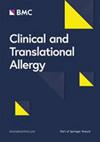Persistent Off-Season Dysregulation of Memory B Cell Subsets in Allergic Rhinitis
Abstract
Introduction
Allergic rhinitis (AR) is a common allergic airway disease. Although B cells play essential roles in AR pathogenesis, their subset distribution outside the allergen exposure period remains poorly characterized.
Objective
To profile peripheral blood B cell subsets in AR patients during the pollen-free season and compare them with healthy controls (HC), aiming to identify persistent immunological alterations and potential biomarkers.
Methods
Peripheral blood mononuclear cells (PBMCs) were collected from a total of 28 participants, 14 patients with allergic rhinitis (AR) and 14 healthy controls (HC) during the off-season. B cell subsets were identified using flow cytometry based on IgD and CD27 expression, classifying cells as naïve (IgD+CD27−), unswitched memory (IgD+CD27+), switched/conventional memory (IgD−CD27+), and unconventional memory B cells (IgD−CD27−). CD38 and CD24 were utilized to further distinguish transitional, naïve, memory, and plasma cell phenotypes. Immunoglobulin isotypes (IgG1-4, IgA1+/IgA2+) were assessed specifically within conventional memory B cells, while CD86 expression was evaluated on IgM+ memory-like and naïve B cells. Additionally, kappa (κ) and lambda (λ) light chain usage was analyzed to assess light chain distribution.
Results
AR patients displayed lower frequencies of IgG1+, IgG2+, and IgA1+/IgA2+ memory B cells, along with elevated frequencies of IgG4+ and κ+ B cells. Additionally, CD86+IgM+ memory-like B cells were significantly reduced in AR, suggesting altered activation dynamics. No significant differences were observed in CD24/CD38 profiling.
Conclusion
Even outside allergen exposure, AR patients exhibit systemic B cell dysregulation, characterized by skewed class switching, altered subset distribution, and reduced activation markers expression. These findings underscore persistent immune imbalance in AR, identify potential off-season biomarkers of allergic inflammation.


 求助内容:
求助内容: 应助结果提醒方式:
应助结果提醒方式:


